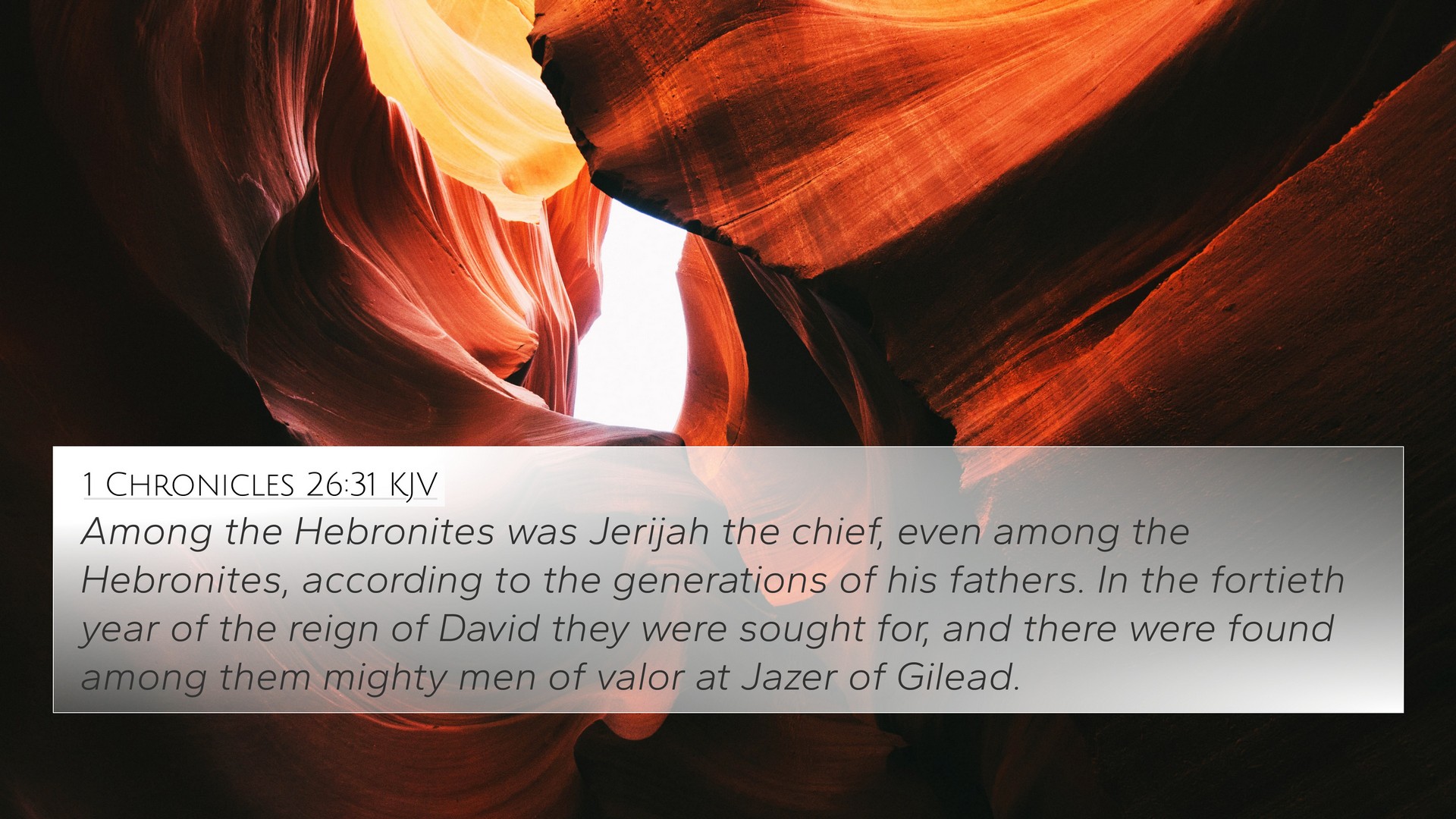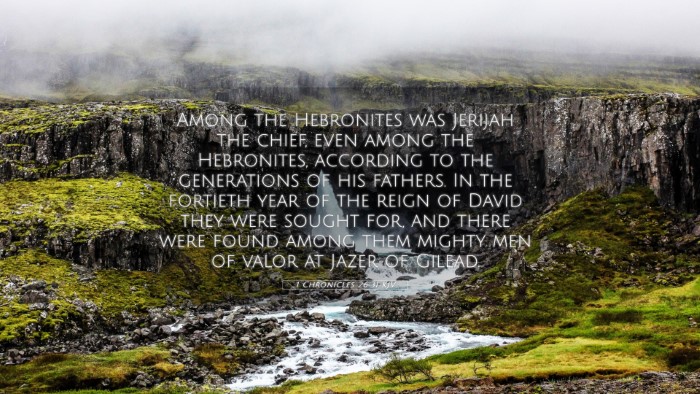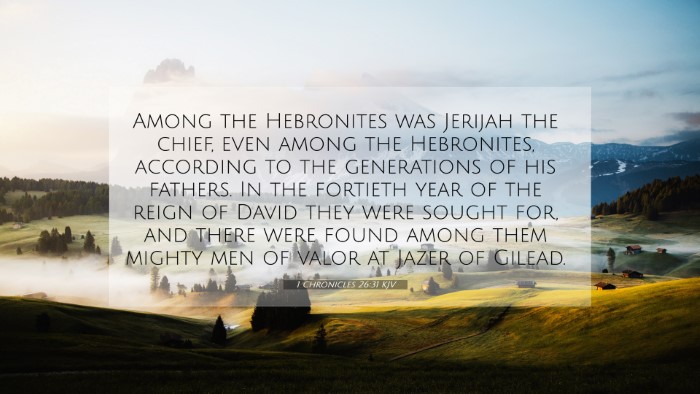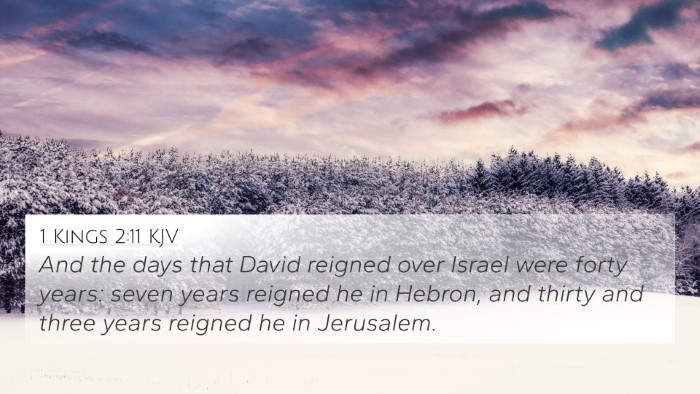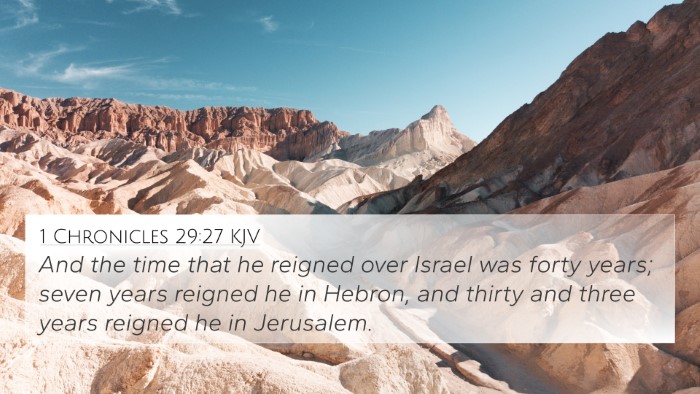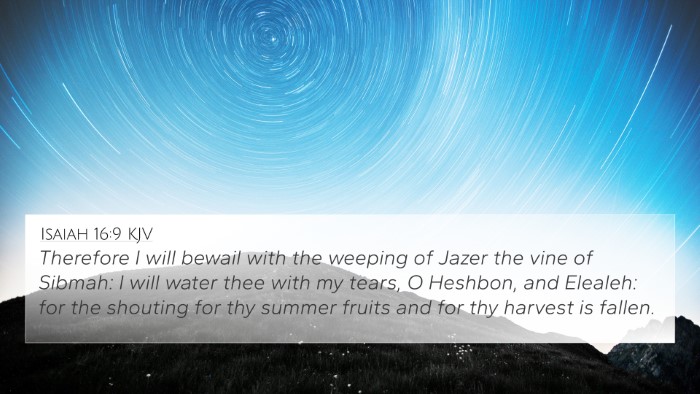Understanding 1 Chronicles 26:31
The verse 1 Chronicles 26:31 serves as a significant part of the historical narrative of Israel, detailing the organization of the Levitical duties. This verse highlights the importance of the Levitical order in serving the Tabernacle and later the Temple, emphasizing roles designated to the descendants of Levi.
Verse Text
1 Chronicles 26:31: "And among the sons of Hebron, Jerijah was the chief, even among the Hebronites, according to the generations of his father. They were among the mighty men of valour at the time of David."
Summary of Insights
This verse illustrates the organization and responsibilities given to the Levites. Here are the interpretations drawn from public domain commentaries:
- Matthew Henry: Henry emphasizes the significance of the Hebronites in the context of David's reign, describing Jerijah as a notable leader among them. He reflects on the might and valor attributed to those who served in these roles and their contributions to the kingdom.
- Albert Barnes: Barnes points out that this verse highlights the lineage of Jerijah, showcasing the fulfillment of God’s promise to the descendants of Levi. He discusses the importance of recognizing each tribe's contributions and how they were crucial to the worship and the maintenance of religious order within Israel.
- Adam Clarke: Clarke comments on the implications of duty and honor shared by the Levites. He articulates how their role goes beyond mere service, reflecting a deeper relationship with God and the community in their function as ministers of worship.
Bible Verse Cross-References
Understanding 1 Chronicles 26:31 can be enriched by examining related Bible verses. Here are several cross-references that provide thematic connections:
- 1 Chronicles 23:24: This passage also discusses the Levites and their roles in the organized worship during King David’s reign.
- 1 Chronicles 15:4: This verse highlights the special selection of the Levites in kingly duties related to the Ark of the Covenant.
- Numbers 3:6-10: Offers a foundational understanding of the Levites' unique calling and responsibilities among the tribes of Israel.
- Hebrews 7:14: This New Testament verse connects Levites' priestly duties to Jesus Christ, emphasizing the change of priesthood.
- Psalm 78:68-71: Details God's choice of David from the shepherding role into a kingly position, linking themes of calling and service.
- Exodus 6:16-25: Discusses the lineage of Moses and Aaron, showing the importance of priestly lineage in Israel's history.
- 1 Samuel 22:2: It mentions those who became mighty men under David, similar to the valor highlighted in Chronicles.
Thematic Reflections and Application
This verse opens pathways for understanding Biblical themes such as:
- Leadership in Service: Jerijah’s role as a chief among the Hebronites reflects the importance of strong, godly leadership in service roles.
- Covenantal Faithfulness: The organization of service within the temple showcases God's faithfulness to His covenants through the specific roles given to the Levites.
- The Value of Heritage: Highlighting not just the responsibilities, but the lineage indicates that our backgrounds and families hold significant meaning in God’s plan.
Using Cross-References for Deeper Study
When studying this verse, it is useful to employ tools for Bible cross-referencing. Here are some beneficial methods:
- Bible Concordance: Utilize a concordance to find related scripture texts and themes related to Levites and their service.
- Comparative Bible Verse Analysis: Compare the roles of Levites in the Old Testament with New Testament principles of service and ministry.
- Cross-reference Bible Study: Engage in studies focusing on the roles and responsibilities of different tribes and their relevance to the church today.
- Inter-Biblical Dialogue: Analyze how the themes represented in this Chronicles verse resonate with those found in both the Old and New Testaments.
Conclusion
The examination of 1 Chronicles 26:31 provides insight into the organization of priestly service in ancient Israel's worship practices. The way the Levites are structured in service reveals deep theological truths that continue to resonate with modern understandings of leadership, heritage, and service in faith communities. Cross-referencing scripture enriches this study, providing broader contexts to the themes of duty and divinely appointed leadership.
